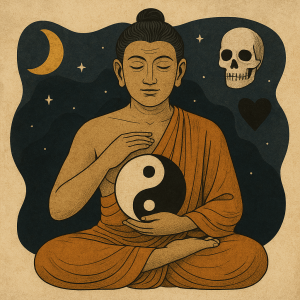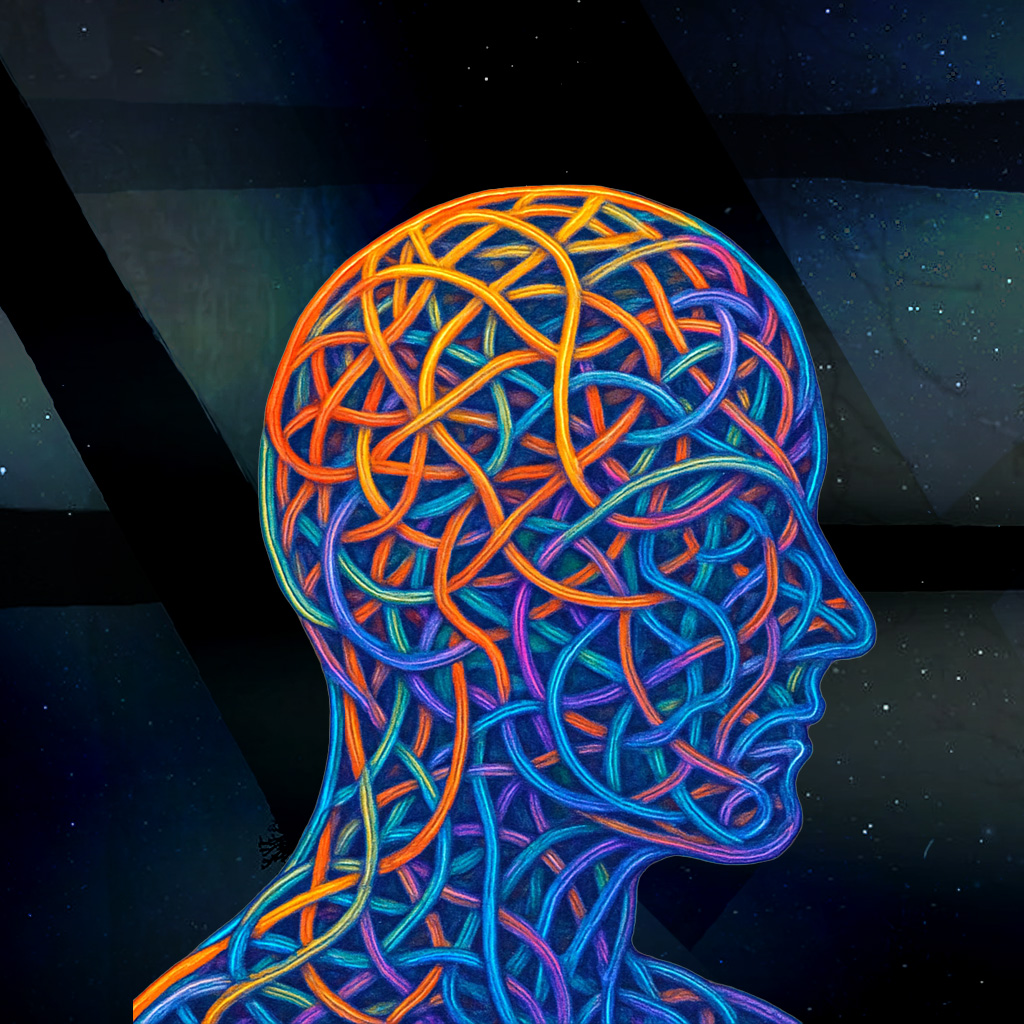
An excerpt from Doug Powers’ “Buddhism for the Modern Mind’’ class at the Berkeley Buddhist Monastery, May 23, 2016 and published in The Path Within.
The basic problem in dealing with emotions is karmic. You not only have to not be attached to what is arising in the present, but you also have to, slowly but surely, as the past is arising into the present, get rid of it thought by thought and feeling by feeling. After all, you have this huge history of feelings and emotions and those are all constantly arising. So one of the major aspects of cultivation or samādhi is that you patiently wait for them all to pass without reacting to them, because every time you react, emotions arise and are reinforced. So, basically, in terms of difficult emotions, you have to not only not react in the present, you also have to patiently wait out all of the past.
Likes or dislikes, pleasure or displeasure, is all karma from the past that is coming into the present.
So, the only way you’re eventually going to be able to move past the karma that is already in motion is patience.
Even if you were to sit in meditation, in super samādhi meditation, as soon as you come out of that samādhi meditation, the past still has not been done away with. And as soon as your mind opens to it, once again the past will emerge and you have to be patient with every aspect of the past as it arises in the present. That’s why the pāramitā of patience is so important. You have to be really patient with your mind, really patient with your body, and really patient with not moving as thought and emotions arise. Emotions that are occurring are all experiences of the past welling up in the present.
Every current moment is basically a neutral experience that is taken over by association with the past.

There’s not a single emotion that is not generated this way. So, emotions don’t happen to you. You have to attend to them when they arise. And if you don’t attend to them, they have nothing they can attach to. If the mind isn’t moved toward the emotion, the emotion has nothing to attach to and disappears like a bubble. But if the mind goes toward the emotion the moment it arises, if the mind picks it up and tends to it, the emotion then begins to take over the consciousness. You are not controlled by emotion. Emotions are experiences of the past coming into the present and the only way emotions have power is by attending to them when they arise in the present. So, if you could really develop samādhi in the present, if you could really develop an awareness, then you could actually not be moved by any emotion that arises and could actually choose every emotion. There’s absolutely no reason why you wouldn’t choose every emotion that you want to attend to.
If you’re not choosing your emotions, you’re an idiot because you’re allowing the emotions to take over the space of your consciousness. We’re all idiots. We have to be really careful because if we don’t understand that, then we actually think that these emotions—likes or dislikes—are actually something that is happening to us. We might even think we are those emotions. That would be really sad. But they are neither happening to us nor what we are, because the consciousness has to attend to them for them to actually exist. The more distance, the more space you can create, the more stillness you can create in your consciousness, the more power you have over the freedom of your mind.
You’re meditating or reciting to create a stillness in your consciousness you can use to not be moved by habituation. That’s what you’re doing.
The point of practice is to create a freedom of mind that doesn’t have to be moved by habituation from the past so quickly. It can actually see the process of choice-making that is occurring.
Every split second the mind is actually making a choice to attend to something with its attention, and by the choice of its attention creates the experience that you’re having in any given moment. Your experience is the attention of the mind on something, it’s not actually happening to you.
Question from the audience: Sometimes I get angry and the anger fills me up before I even get a chance to respond. I’m not even cognizant of the fact I’m angry until I’m in the midst of the anger. Once in a while I’m able to see that emotion welling up inside me and I think, “Oh, this is arising in me.” I can’t say I make the decision not to be angry, but I don’t engage in it and it actually dissipates by itself. I think this sort of speaks to what you were saying just now about choosing whether or not to engage the mind in certain emotions. In the first situation where anger consumes me so quickly, I don’t even see it happening, what is the momentum that carries it forward so that it consumes my space?
Doug: The momentum is habituation. It’s the power of habituation. In fact, going to something like anger, there are many choices the mind has made before it gets to anger. Remember, there has to be some sort of irritation and the irritation is somebody messing with ME, somebody does something or makes some comment or acts in a certain way, and the irritation is the movement of the mind of being disrespected, disregarded, etc., and we could go through a hundred reasons why that happens.
If we look at the mind when it first moves toward the emotion, behind that we’ll find attachment to the view of self.
There’s no anger that doesn’t come from an attachment to the view of self. Guaranteed.
I guarantee you that at the heart of every single anger you’ve ever had was an irritation based on the view of self that was messed with in some kind of way or another. Your theory of self, your attachment to a self or some idea of someone you thought you were was being messed with. So, if you could watch the self constantly, your theory of self, your sense of self, of who you think you are— if you could watch where that ends, then you could actually see the moment of irritation and even choose to get irritated or not.
So first of all, you could choose to not even have a view of self. Now, granted, that’s pretty deep, to watch from the place where the self first emerges. That’s pretty deep, but it’s possible. If you were really meditating, you could actually watch for your “self ” being moved. If you’re not at that level at least you could watch where the irritation is arising. And if you can catch the irritation where it is arising, then, if you can be patient with not engaging in the irritation through recitation or samādhi or whatever method you’re using, that irritation loses its momentum.
Once your irritation has arisen, then it escalates. You could actually watch it escalate in yourself, you can watch it move from feelings to thoughts to body, and even if you catch the anger while it is still in the process of your own self before you said anything else or have done anything with your body to someone else, you still have control over the karma. But as soon as your body has acted on the anger, now you’ve lost control over the karma.
There’s a huge difference between the moment that the anger arises and has even reached a fairly high level within yourself, and the moment you take action on its basis, because as soon as you’ve taken action, now it’s going to be up to someone else. You’ve lost control over the karma. Now that karma’s gone out into the universe, and it’s coming back. And as anybody knows in here, a moment of anger could actually fundamentally change your life very easily. It doesn’t even have to get to the anger where we are shouting out or something; it can get to a lack of feeling in a relationship, for instance.
A moment of anger could have a huge impact and what’s said from that moment of anger could have a huge impact on the amount of trust, care, and everything else involved in the dynamic of the relationship.
A certain amount of anger could actually change the level of trust, the fundamental level of trust in a dynamic situation between people; it could fundamentally change the karmic conditions.
We have to make distinctions all the way from the first movement of the mind. From that first moment all the way to an action, when we finally get out our guns and start to shoot them all the way down the road. So the degree to which you have enough stillness that you could observe from is the degree to which, earlier in the process, you can catch it. The reason it reaches anger right away is because those places that are habituated—for example, with your dad, whatever he said that irritated you from the time you were seven years old, or when he takes that action or says that thing—the habituation is so great that the immediate response is anger, because it is habituated over time. All these immediate angers are habituated. They are histories of habituation. They move so fast, you can’t see them. The boss thing, the wife thing, the parents’ thing, the kids thing—you know, they are habituations of some context that have already been built in. The speed of that is the momentum that you were talking about.
Subscribe to Our Newsletter
Get nourishing and mind-expanding writings in your inbox.


